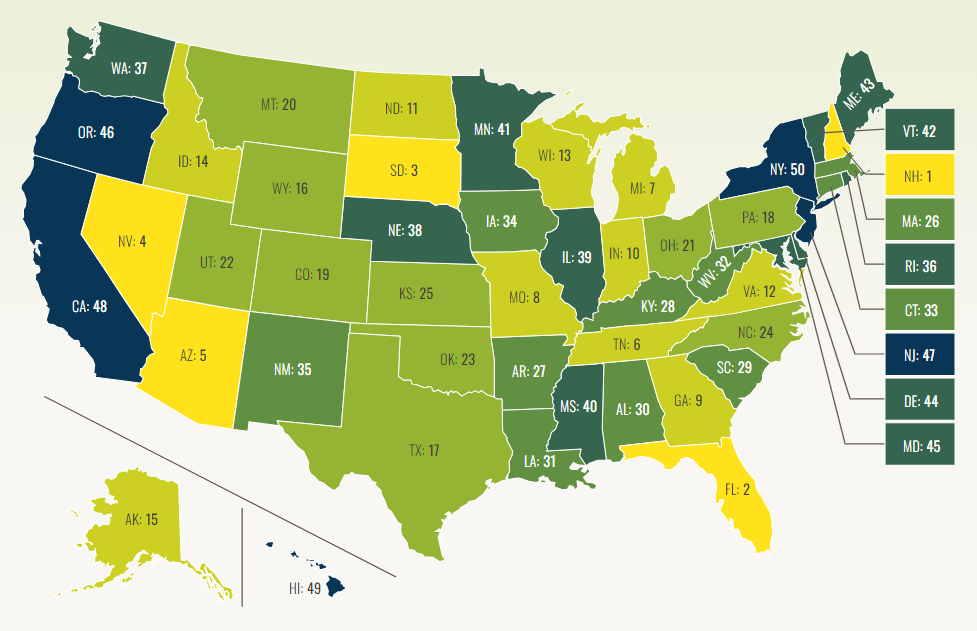Kansas ranked 25th freest state in new report

A new report from the libertarian think tank the Cato Institute has ranked all 50 states in order of freedom. The report, called ‘Freedom in the 50 States,’ claims to be “the first index at any level to measure both economic and personal freedoms and remains the only index to do so at the state level.”
The report uses a variety of metrics from school choice to gun laws to medical freedom and so much more.
The top five freest states are:
- New Hampshire (0.71)
- Florida (0.57)
- South Dakota (0.52)
- Nevada (0.51)
- Arizona (0.44)
The least freest states include:
- New York (-0.77)
- Hawaii (-0.72)
- California (-0.58)
- New Jersey (-0.42)
- Oregon (-0.40)
Kansas is in the middle with an overall rank of 25 and a score of 0.12. This is up three spots from last year when the report ranked Kansas at 28.
Since the report started coming out in the year 2000, Kansas has never been ranked in the top ten freest states. However, Kansas was ranked number 11 in 2014, but has since seen a significant decrease in its rank, having been ranked in the 20s since 2017.
Nevertheless, there are categories where Kansas really shines and other categories where Kansas really doesn’t.
Overall freedom for this report is broken down into economic freedom and personal freedom. Economic freedom is broken down further into fiscal freedom and regulatory freedom. The report also provides policy ideas on each of these categories to ensure the people of the state become more free.
Fiscal Freedom #38
Kansas is ranked at number 38 for fiscal freedom. There are a number of subcategories under this category and Kansas does not rank well with any of them. However, where Kansas really hurts the most is in government employment where it ranks 45. “Government employment refers to the state’s workforce, which can crowd out employment in the private sector,” according to the report.
When it comes to fiscal freedom policy ideas, the report suggests cutting spending on hospitals as the state spends more than twice as much as the national average. Cuts are also suggested for education, public buildings, libraries, and utilities where we also spend more than the national average. They suggest that this is done through privatization of hospitals and utilities and reducing the amount of government employment.
Regulatory Freedom #1
Despite Kansas not ranking well for fiscal freedom, according to the report, Kansas is the best when it comes to regulatory freedom. In the seven subcategories, Kansas ranks in the top 10 in all but one.
As far as policy ideas go to ensure Kansas stays number one, the report suggests abolishing the price-gouging law which was implemented during the start of the government lockdowns of 2020. The report also suggests getting rid of the “competitor’s veto” of new moving companies. A “competitor’s veto” is a certificate of need (CON) law. It’s a way for businesses to keep new businesses from being legally allowed to continue to operate solely on the basis that those businesses don’t want competitors.
Personal Freedom #37
Much like fiscal freedoms, Kansas doesn’t do so hot when it comes to people’s personal freedoms, according to the report. This category has a ton of subcategories from victimless crimes to guns to tobacco and education. However, the only subcategory where Kansas actually does well is with gun rights where we have been ranked number one for the past eight years.
The big suggestion the report gave to help improve this section was to deregulate nonsectarian private schools and adopt a universal education savings account program.
Thanks for reading. Be sure to share and subscribe. You can also help support independent journalism in Kansas by buying me a coffee at buymeacoffee.com/kscon.

Ian Brannan
Ian Brannan is an independent journalist who founded The Kansas Constitutional in April 2022. His work focuses on issues including abortion, Convention of States, drug policy, education, government, LGBT issues, media, and more. He is also the co-host of the Remember COVID podcast.
